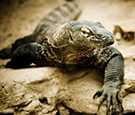
Let's start with a quiz! What do the water flea, the marbled crayfish and the boa constrictor have in common? No, they're not merely the nicknames of your daughter's high school boyfriends. All these animals can produce offspring without a fertilized egg!
This asexual reproduction, called parthenogenesis, comes from the Greek meaning "virgin birth". We're discovering that more species are capable of this than we ever knew.
Nearly all reproduction requires the union of a sperm and an egg, but in parthenogenesis only the female chromosomes are involved, producing, in most cases, identical clones of the mother. Species that strictly reproduce this way, such as the New Mexico whiptail lizard, risk genetic mutations in the long run without a diverse gene pool. But one species found a clever way to mix up its genes by incorporating DNA from its environment.
For over 40 million years the microscopic bdelloid rotifers reproduced asexually by ingesting DNA present in their freshwater pools. Over the past decade, scientists discovered, quite by accident, that several animals they kept in captivity were capable of parthenogenic reproduction.
Two female Komodo dragons kept separate from males produced healthy clones even though in the wild they produce sexually. A hammer head shark and a boa constrictor, both in captivity, also produced clones.
We don't know what triggered these species to begin non-sexual reproduction, and we haven't seen it in mammals. But understanding this process may one day help save endangered species.
More Information
Slideshow: Virgin Birth Not So Miraculous in Animal Kingdom
Science — "For billions of Christians around the world, the holidays are a time to celebrate Jesus' birth to the Virgin Mary. But for many animals, virgin birth is far from a miraculous event. Researchers have discovered a growing number of species that reproduce without assistance from the opposite sex."
Birth of parthenogenetic mice that can develop to adulthood.
Nature. 2004 Apr 22;428(6985):860-4.
Kono T, Obata Y, Wu Q, Niwa K, Ono Y, Yamamoto Y, Park ES, Seo JS, Ogawa H.
Can artificial parthenogenesis sidestep ethical pitfalls in human therapeutic cloning? An historical perspective.
J Med Ethics. 2005 Dec;31(12):733-5.
Fangerau H.